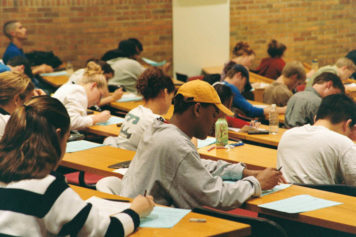
The study, published last month in the American Sociological Review, is one of the first investigations to look at how other students in a school are impacted when the school over-relies on suspension to punish misbehavior and get rid of unruly students. Just like the study that found that other students are emotionally damaged by witnessing a bully in action, this study should serve as a cautionary warning to school officials about how their actions can affect everyone in the building.
Since most every statistic and study has revealed that African-American students are suspended far more than other students, it is fair to conclude that this practice could be lowering student performance in schools with large Black student populations.
Just yesterday, the Los Angeles Unified released data showing that although 25.5 percent fewer students were suspended in the last school year, African-American pupils remained far more likely than their peers to be removed from classrooms for disciplinary reasons.
African-American students in the Los Angeles district received 32.3 percent of suspensions last year while only making up 9.16 percent of the entire student body.
The report on the impact of suspensions was done by University of Indiana professor Brea Perry and University of Kentucky professor Edward Morris, who said they were motivated to investigate the impact of suspensions because they knew that high incarceration rates can have a devastating impact on offenders, as well as on surrounding families and communities. They set out to see if a similar result was found in schools.
They followed about 16,000 middle school and high school students in a Kentucky district over the course of six semesters, tracking student scores on a statewide test administered three times a year and compared it to the school suspension rates during the time of test taking. Of course, they controlled other factors that are correlated with a school’s suspension rate, like poverty.
They discovered that high rates of school suspensions had a substantial negative impact on individual students’ test scores. This effect was especially dramatic in schools with typically low levels of violence, making suspensions an especially traumatic event for everyone.
“Low and moderate levels of suspension are benign … there is no benefit or harm,” Perry told the Huffington Post. But when the suspension levels become “excessive,” it starts to affect “the achievement of non-suspended students.”
“[Excessive suspension caused] negative consequences in all schools, but it was especially harmful when the level of violence in school is low,” she said. “Suspension is most detrimental when it is probably perceived by students as illegitimate, overused or used inappropriate. Kids are looking around saying, ‘This is happening way too often, things in school are great, and you’re using suspension.’”
The report found that when a school with typically low levels of violence experiences high rates of suspension, “the predicted percentile score in reading achievement decreases from about 54th at the mean level of suspension to 28th at very high levels of suspension.”
The researchers found that high suspension rates “can create a heightened sense of anxiety” for students and that “turnover of suspended students in and out of classrooms creates unstable, socially fragmented environments.”
The researchers found that African-Americans were disproportionately suspended in the Kentucky schools, just as they are across the country.
Suspension should be used as a last resort, limited to situations where the safety of students is threatened, Perry said, pointing out that test scores actually increased at one school that implemented a suspension diversion program, where misbehaving students were asked to sit and do homework rather than being sent away.
